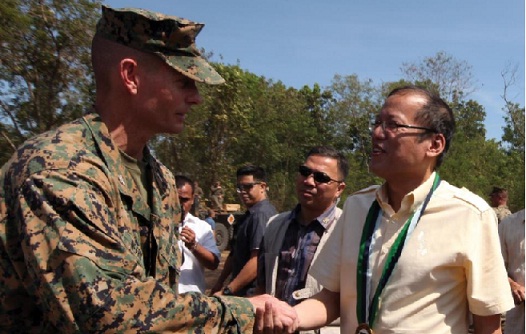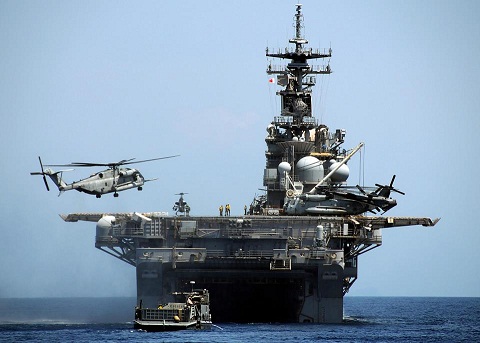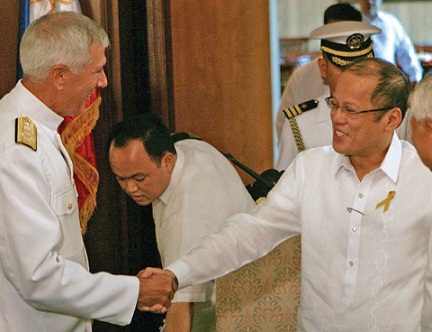
Pres. Aquino greets Col. Stephen Neary, commander of the US Marines participating in 2011 Balikatan exercises.From Exercise Balikatan facebook.
Those who have taken these view will be disappointed because the U.S has taken a neutral position in the conflicting claims in the South China Sea (part of it is referred to as West Philippine Sea) and has always been consistent in urging for a peaceful resolution of the conflicting claims.
The Obama administration has decided to rebalance its military forces from Middle East to Asia, in what is seen by analysts as a move to contain China’s hegemony in the region.
Primarily, the U.S. wants to ensure that the sealanes are open and unhampered for international navigation.
But as former UN Representative Lauro Baja, Jr. observed, the Americans do not want to ‘vulgarize’ this objective.
In increasing its presence in Asia, the United States does not want to play referee to countries fighting over islands, rocks and shoals. “They want a stable region. They don’t want to prejudice their strategic relations with China, which is more important than claims over rocks and shoals,” Baja said.
In preparation for the implementation of their Pivot to Asia policy, senior American officials have been coming here the past months and assessing the situation. One thing that they were concerned about is the tension between the Philippines and China over the disputed islands especially Bajo de Masinloc otherwise known as Scarborough Shoal or Panatag shoal and lately the Ayungin shoal.
The Philippines has filed a suit with the UN Arbitral Court questioning China’s nine dash-line, which encompasses the whole South China Sea including several countries’ territories.
A source said some of the analysts interviewed by American officials said that the “Shame China” strategy of the Department of Foreign Affairs under Foreign Secretary Albert del Rosario has contributed largely to the deteriorating relations between the Philippines and China.
Del Rosario has, several times accused China of “duplicity and intimidation.” Malacañang spokesperson Edwin Lacierda has also made sure that he is not behind in China-bashing.

A US Marine Corps helicopter and Navy LCAC vehicle approach USS Essex during Balikatan 2009. From Exercise Balikatan Facebook.
In his 2011 SONA, Aquino, declared: “ There was a time when we couldn’t appropriately respond to threats in our own backyard. Now, our message to the world is clear: What is ours is ours; setting foot on Recto Bank is no different from setting foot on Recto Avenue.”
He was referring to the disputed Recto or Reed Bank near Palawan.
In his 2012 SONA, he talked lengthily about the situation in Bajo de Masinloc. He said, “We demonstrated utmost forbearance in dealing with this issue. As a sign of our goodwill, we replaced our navy cutter with a civilian boat as soon as we could. We chose not to respond to their media’s harangues. I do not think it excessive to ask that our rights be respected, just as we respect their rights as a fellow nation in a world we need to share.
“There are those who say that we should let Bajo de Masinloc go; we should avoid the trouble. But if someone entered your yard and told you he owned it, would you agree? Would it be right to give away that which is rightfully ours?”
Aquino can be stubborn. But he listens to America. Last year,a month after he withdrew all the ships from Bajo de Masinloc, he, supported by the majority of the members of his cabinet, decided to send back the ships to the area which was by then already controlled by the Chinese. Upon learning of Malacañang’s decision, the U.S. relayed the advice through defense officials that it would not be wise to send back the ships to Bajo de Masinloc. The ships were not sent back.
Our source said, two weeks before the President’s State of the Nation address, U.S. officials advised the DFA and Malacanang to tone down their anti-China rhetorics to reduce tension in the region. That explains why in last month’s SONA there was no mention, not a word, about conflict with China.
Last Aug. 2, Del Rosario, who never let any media opportunity to censure China pass, told members of the foreign correspondents association in the country, that he was not keen on guesting in their forum on the South China Sea because he was “looking for a modus vivendi with China.”
China should thank Uncle Sam.

